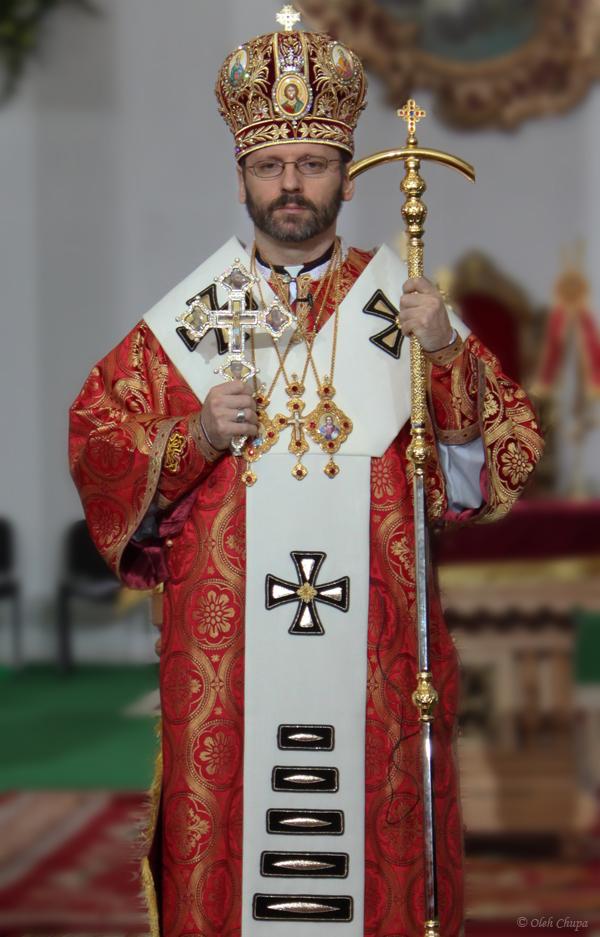Major Archbishop Sviatoslav Shevchuk, head of the Ukrainian Greek Catholic Church, has opposed a draft bill banning the activities of the Moscow Patriarchate in Ukraine, saying the measure is not only problematic in terms of religious freedom but would turn Russia’s supporters into martyrs.
Newsroom (22/01/2023 8:56 PM, Gaudium Press) — Speaking to the Ukrainian Pravda news agency, Shevchuk was asked about a draft bill submitted to the Ukrainian parliament banning the Ukrainian Orthodox Church of the Moscow Patriarchate, saying, “I question it. I do not want to give prescriptions for our legislators.”
This, Shevchuk said, is because the Ukrainian Greek Catholic Church was once formally banned itself under Soviet communist rule.
“We survived underground. Moreover, the very fact that we were a martyred church that did not become a collaborating church with the Soviet authorities saved our moral authority,” he said, insisting that just because a church is banned “does not mean the end of its existence.”
A church, he said, “is not only a religious structure, not some organization that has a charter, a leader, a religious center. The Church is people who also have constitutional rights. As long as there will be people who are oriented towards Moscow Orthodoxy in Ukraine, that church will exist – even when, according to state law, it would be illegal.”
He argued that banning the church at an official level would “give this church the palm of martyrdom,” and will allow Moscow loyalists “to really go into silent opposition and become those who will then claim authenticity.”
Shevchuk said he recently told one Ukrainian legislator, “If you want to perpetuate the Moscow Patriarchate in Ukraine, ban it.”
On the other hand, Shevchuk also said each state has the right and the responsibility to ensure its national security and that if there are “traitors,” regardless of their religion, who pose a real threat in times of martial law, “they must be identified and, observing all laws, take the next steps.”
“You should not be persecuted for belonging to some church structure, no. But for crimes against our country, here we are all equal,” he said.
He suggested asking the question of banning the Moscow Patriarchate “in a different way” that makes it clear the measure “is not really about restricting someone’s religious freedom.”
The point, he said, “is that our northern neighbor, who is killing us today, cannot use any of the churches for his geo-political purposes.”
In March of last year, a draft bill was submitted to the deputies of the Verkhovna Rada, Ukraine’s unicameral parliament, banning the Moscow Patriarchate, including the Ukrainian Orthodox Church of the Moscow Patriarchate (UOC-MP) – a branch of Orthodoxy in Ukraine that reports to Moscow – from the territory of Ukraine.
The draft bill stipulates that all property belonging to the Russian Orthodox Church and its authorities, including affiliated religious organizations, synod institutions, and diocesan administration, be inventoried and nationalized within 48 hours of the bill’s ratification.
All religious communities, monasteries, and theological schools belonging to the Moscow Patriarchate are allowed 14 days from when the law enters into force to change their subordination.
Even without the parliamentary bill, some Ukrainian cities had already taken steps to ban the Moscow Patriarchate in their local territories, including the western city of Uzhhorod.
On Thursday the bill was submitted to parliament, banning the Ukrainian Orthodox Church of the Moscow Patriarchate if it is found by authorities to be colluding with Russia.
Specifically, the bill includes amendments to current legislation rendering impossible any activity of religious organizations that are governed outside of Ukraine and whose headquarters are located in a state carrying out armed aggression against Ukraine.
The bill was prepared at the request of Ukrainian President Volodymyr Zelenskyy, who on Dec. 11 asked parliament to submit a measure banning religious organizations “with centers of influence in the Russian federation” and to scrutinize the UOC-MP for ties to Moscow.
The submission of the bill on Jan. 19 is among the latest developments in the protracted conflict unfolding in Ukraine, which is now in its eleventh month following Russia’s invasion on Feb. 24, 2022, sparking an all-out war that has left hundreds of thousands dead and millions displaced.
Almost a year in, the war shows no signs of ending and both sides are refusing to back down from their demands, making peaceful negotiations for a ceasefire impossible. The Vatican has repeatedly offered to help mediate a solution to the conflict, however, these offers have so far been declined.
In a conflict defined as much by its ecclesial politics and its geopolitical disputes, religious leaders, who have been protagonists since the beginning, are increasingly speaking out, including at international forums.
Russian Orthodox Patriarch Kirill – who has vocally defended the war on religious grounds – in a recent sermon warned that the western desire to defeat Russia has acquired new and “very dangerous forms,” and prayed that God would “enlighten those madmen and help them understand that any desire to destroy Russia will mean the end of the world.”
He also prayed that the world would “acquire some new consciousness” in terms of its interdependence and the preservation of faith in God, “without which all other values are either deformed or simply reformatted into opposites and become not values, but factors contributing to the destruction of human life.”
Kirill voiced confidence that God would not abandon Russia, its authorities, nor its army, and that Russia would “have enough strength if necessary to protect its land and its people,” but voiced confidence that reconciliation would be possible and that “things do not come to such a showdown.”
In an address to participants of a Jan. 17 UN Security Council meeting, various heads of churches and religious organizations in Ukraine lamented the “colossal suffering” caused by the war, saying “people’s freedom, their religious beliefs became almost the first target of the Russian occupier.”
So far, nearly 270 churches and sacred buildings have been destroyed and dozens of clergy killed, they said, saying, “Wherever Russia goes, religious freedom ends.”
Faithful are fighting on the frontlines, the religious leaders said, to ensure that Ukraine remains a place where “where everyone has the right to believe in what he considers worthy faith, where religious minorities feel as comfortable as the Churches that unite millions of believers.”
They appealed to the international community to help Ukrainians “resist the Russian invasion, which brings death, slavery, darkness and religious oppression.”
Ukrainian Greek Catholic Archbishop Borys Gudziak, metropolitan of the archeparchy of Philadelphia, recently spoke at the World Economic Forum in Davos, where he stressed the importance of continuing to provide support to Ukraine.
“The world has never seen such solidarity, which began after February 24,” the day that Russia invaded, he said and praised the financial and defence support provided to Ukraine by the United States.
Gudziak also condemned what he said are violations of international law by Russian troops in occupied territories, saying international law stipulates that occupiers should provide food and medical care, and should ensure religious worship.
“People should not be deported or forced to work for the military. And under no circumstances should they be taken to the army of the invaders. All these provisions are grossly violated by the Russians,” he said, saying Russian soldiers “torture Ukrainians. People disappear, and many are killed.”
“The long-term consequences of these atrocities will need to be addressed in the future,” he said and stressed the need for trauma recovery.
“Ukraine needs a reconstruction plan similar to the ‘Marshall Plan,’” he said, saying, “We can’t afford to be defeated by fatigue.”
Named for US Secretary of State George Marshall, the “Marshall Plan” proposed that the United States offer economic assistance to restore Europe’s economic infrastructure following the Second World War, resulting in the transfer of some $13 billion to western European economies.
In a recent address at a UNESCO event in Italy, the Vatican Secretary for Relations with States, British Archbishop Paul Gallagher, stressed the importance of seeking a diplomatic solution to the Ukraine war, “even if at the moment there seems to be no basis for any negotiations.”
“We must keep alive the ideal of peace and the idea that this war will end, even if it will not be the end imagined by President Zelensky or [Russian President Vladimir Putin],” he said, and stressed the need for “a just peace.”
Peace, he said, “must be concrete, flexible, and in the making, so that it is the link in a new virtuous process between the conflicting parties and not just an allocation of winners and losers.”
To this end, diplomacy, Gallagher said, “should not be an expedient to stop conflicts with armed truces, but an instrument of preventive cohesion.”
- Raju Hasmukh with files from Crux Now



































